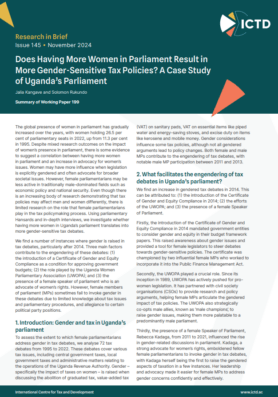Research in Brief 145
The number of women in parliaments globally has slowly but steadily increased over the years. In Uganda, this number has increased from two women at Uganda’s independence in 1962 to 189 women in the current parliament.
To understand the impact that female parliamentarians have on tax debates, we analyse the contents of 72 tax debates that were held in Uganda’s parliament between 1995 and 2022. We then interview former and current members of parliament, officials from the Uganda Women’s Parliamentary Association and the Equal Opportunities Commission and representatives from civil society organisations. We find that most of the gendered tax debates are on issues relating to value-added tax and excise duty, with both female and male parliamentarians playing important roles in engendering these debates. While the engendering of tax debates can be traced back to the early 2000s, it was not until 2014 that gender became a more frequent component in these debates. In addition to the increase in the number of women in parliament, we find three other factors that facilitate the invoking of gender in tax debates: the introduction of the Certificate of Gender and Equity Compliance in 2014, the efforts of the Uganda Women’s Parliamentary Association and the presence of a female speaker of parliament. However, female parliamentarians are constrained in their ability to invoke gender in tax debates because they have limited tax knowledge and are sometimes constrained by political party positions.
Summary of Working Paper 199.

